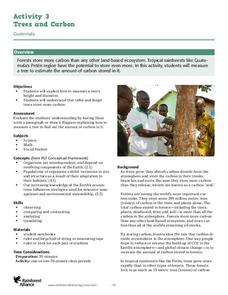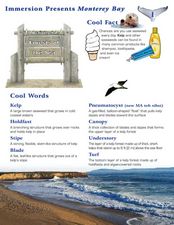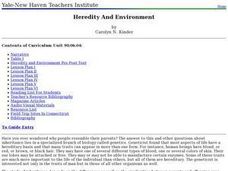Curated OER
Weave an Aquatic Food Web
Students explore organisms that are part of interconnected food webs. In this food web lesson, students choose an animal and research what the animal eats. Students begin with the food chain and branch out into the interconnected web...
Curated OER
Lesson 2: The Tired King
Learners are introduced to the three functions of government (legislative, judicial, and executive). They read and discuss a story about an overworked king who must handle all the tasks of government. Students give a description of the...
Curated OER
Introduction And Brief History of Materials Science
Students develop an understanding of the concept of matter. They l participate actively in the bubble raft experiment as described on the Center for Thermal Spray Research's website. They demonstrate dislocations and grain...
Virginia Department of Education
Weather Patterns and Seasonal Changes
Get your class outside to observe their surroundings with a lesson highlighting weather patterns and seasonal changes. First, learners take a weather walk to survey how the weather affects animals, people, plants, and trees during...
Curated OER
Letters to the Government
Seventh graders examine how to be active participants in their local, state, or federal governments. They create a powerpoint presentation and write a letter to one of their governmental representatives about a problem and solution of...
Curated OER
How Does Your Garden Grow?
Young gardners read and listen to books about seeds, plants, and the growing process. They plant seeds in plastic cups to observe the process of root-growing and plant formation. The whole class walks through a field to collect seeds...
Curated OER
The Four Groups of Biologically Important Compounds
This is not they typical set of teacher instructions. It is an organized chart of the important organic compounds. For each, the involved elements, the name of the building block monomers, the names of polymers, extra information, and a...
Teach Engineering
Clean it Up!
Harness the power of bacteria. Scholars see how using organisms that exist in nature can help solve human problems in the process known as bioremediation. They research and discuss several successful examples, such as using oil-eating...
Alabama Learning Exchange
Good Litter, Bad Litter
Which ones can be thrown on the ground? Discover the difference between natural litter and unhealthy trash, helping scholars by using several examples. Use the information here to give them a basic background, but also encourage prior...
Rainforest Alliance
Trees and Carbon
You'll find everything but the kitchen sink here ... or just a carbon sink. In the activity, pairs or groups of middle school learners go outside and measure a tree's circumference and height to estimate its carbon storage potential and...
Curated OER
RESPONSIBILITIES OF OFFICE
Students make an organizational chart. They show the relationship of power in the executive branch of the Illinois state government. They include the responsibilities of each office and define the roles and responsibilities of top...
Curated OER
Mighty Oaks from Little Acorns
What does it mean to grow? To germinate? For the plan detailed here, class members investigate the growth process of an oak tree while focusing on the beginning stages of planting and germination. They plant seeds and record observations...
National Institute on Drug Abuse
The Brain's Response to Drugs
Marijuana affects the brain differently than inhalants, which have a different effect than opioids. Elementary and middle school classes read about these drugs as well as nicotine, methamphetamine, hallucinogens, and steroids before...
Curated OER
How Trees Contribute to the Water Cycle
For this water cycle instructional activity, 3rd graders conduct an experiment where they observe and calculate how water transpires in different types of trees. Students engage in a class discussion and use Venn Diagrams to compare...
Curated OER
Small Pond Creatures
Students complete a unit about the different creatures that can live in a small pond habitat. They create a glossary, create a class Small Pond mural, develop a Frog Fact File, read a variety of books, and conduct research for a report...
Curated OER
Forests of the Sea
Young scholars read about and conduct experiments to learn about the vegetation under Monterey Bay. In this Monterey Bay lesson, students read about and look at brightly colored pictures of the different types of seaweed that grows in...
Curated OER
PRIMATE CLASSIFICATION: Evolution, Cladograms,
Students transfer examples (names) of primates from their location in an outline hierarchy of primate groups into a set of nested boxes reflecting that same hierarchy. A cladogram can then be drawn illustrating how these groups are...
Curated OER
Vector Voyage!
Learners use vector analysis to examine the concept of dead reckoning. They listen to a teacher-led lecture, complete a Vector Voyage Worksheet with the teacher, answer discussion questions, and use the Pythagorean Theorem for speed...
Curated OER
Structures and Behaviors of Planarians
Learners investigate planaria of the phylum platyhelminthes. They use DigiScope technology to observe and describe the structure and movements of planarians.
Curated OER
Classroom Cladogram of Vertebrate/Human Evolution
Students build a Colossal Classroom Cladogram of vertebrate evolution. After putting it together, they show the gradual, mosaic accumulation of the traits which we, as humans, possess.
Curated OER
My Tree Book
Students "adopt" a tree and throughout the year record and examine its characteristics and the changes that it goes through.
Curated OER
Heredity And Environment
Students complete a pre-test on the relationship between heredity and the environment. As a class, they write down descriptions of themselves and identify which traits can be changed and not changed. In groups, they determine which genes...
Curated OER
Ecology
Students make connections between their daily lives and the usage of natural resources as they relate to the importance of environmental quality. In this ecology lesson, students listen to the story The Lorax by Dr. Seuss and then...
Curated OER
Plastics by the Numbers
Students investigate plastic resins and their uses. In this plastics lesson plan, students describe major plastic resins and what they are used for, they compare and contrast the properties of plastic resins and they list products that...

























